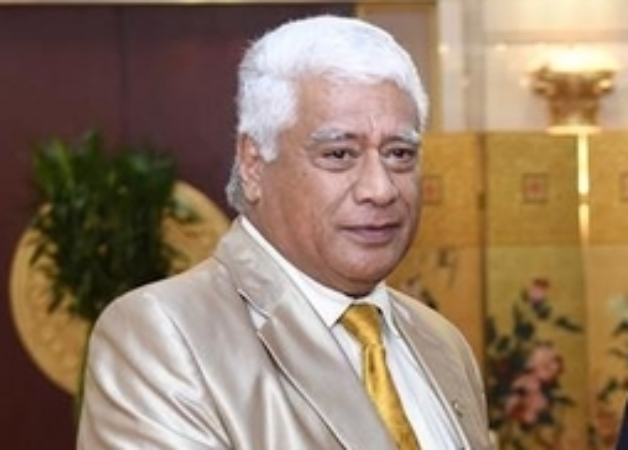The Supreme Court of Tonga ruled today that the police were not acting maliciously when they prosecuted Lord Tu’ivakanō before he went on trial in February 2020.

The king’s noble was charged with five counts of accepting a bribe as a government servant, money laundering, perjury, making a false statement for the purpose of obtaining a passport and possession of a firearm and ammunition without a license.
Lord Tu’ivakanō pleaded guilty to the possession of a firearm on March 2020. The jury found him guilty on the perjury, false statement and possession of ammunition charges.
On April 24, 2020 the former Speaker was sentenced on the bribery and money laundering charges to two years imprisonment, fully suspended on conditions including 100 hours community service and fined on each of the firearms and ammunition offences.
However, he appealed against the convictions and on October 30, 2020, the Court of Appeal acquitted him of the perjury and false statement charges and dismissed the appeal in respect of the ammunition.
The lawsuit
In April this year the noble MP commenced this proceeding in which he claimed a total of TOP$5.75 million in damages for malicious prosecution.
He claimed general, aggravated and exemplary damages for “wrongful arrest, imprisonment, conviction and punishment” in consequence of alleged malicious prosecution and misfeasance in public office by the defendants, which included the former Minister of Police, Attorney General and the Commissioner of Police.
The court summarised Lord Tu’ivakanoo’s claims under a number of paragraphs including saying the former late Prime Minister was “largely responsible” for the prosecution of the Plaintiff and he and the former Minister of Police were motivated by malice and had an “active role” in the police charging and arresting the Plaintiff
The defence denied the claims saying that at all material times, they had reasonable grounds and sufficient evidence at the time to lay the charges and to prosecute Lord Tu’ivakanō.
The ruling
The ruling clarifies standards for when wrongly accused individuals can sue for malicious prosecution.
Lord Chief Justice Michael Whitten said “that proof of malice will often be a matter of inference, but it is proof that is required, not conjecture or suspicion”.
“At the forefront of the Plaintiff’s pleaded allegations of malice, and in his evidence, was the Plaintiff’s belief that the police investigation and subsequent prosecution was politically motivated”.
Mr Whitten said, that was based on certain public statements by the late former Prime Minister to the effect that he considered that Lord Tu’ivakanō was involved in the unlawful sale of Tongan passports.
“It was also based on the assertion that the former Minister of Police was responsible for instigating the police investigation which ‘targeted’ the Plaintiff. In closing submissions, the strength of that belief appeared to have waned somewhat when counsel for the Plaintiff wrote that the Plaintiff believed that former Prime Minister Pohiva ‘had something to do with his prosecution’”
Mr Whitten said Lord Tu’ivakanō has failed to establish, on the balance of the probabilities, that the police investigation and criminal prosecution against him was without reasonable and probable cause or that it was motivated by malice.
“Accordingly, the Plaintiff’s claim is dismissed”.
———– FAKAMATALA FAKATONGA NOUNOU ——————-
Kuo ‘ikai tali ‘e he ‘Eiki Fakamaau Lahi ‘a e ‘eke $5.75 miliona ‘a Looti Tu’ivakanō ke totongi huhu’i ange mei he pule’anga Tonga’ he’ene tui na’e fakahoko ‘i he fakalotokovi ‘a hono faka’ilo ia ‘e he kau polisi’ ‘o tukuaki’i ki heni ‘a e Palēmia ki mu’a ‘Akilisi Pōhiva mo e Minisitā Polisi ‘aho ko ia’ Māteni Tapueluelu. Na’e toe faka’ilo foki mo e pule’anga Tonga, Komisiona Polisi’ pehē ki he ‘Ateni Seniale’. Ne ‘ikai tali ‘eni tu’unga he pehē ‘e ‘Eiki Fakamaau Lahi Whitten na’e ‘ikai lava ‘e he nōpele’ ni ke ne fakamo’oni’i ta’etoeveiveiua na’e fai hono faka’ilo’ he funga ‘o e fakalotokovi. Na’e faka’ilo foki ‘a Tu’ivakanō ki he hia ko e fa’u ha fakamatala ta’emo’oni ke ma’u ta’efakalao ai ha paasipooti, tali ha totongi fakafufū, fō e pa’anga ‘uli, fakafe’ātungia’i e ngāue ‘a e kau polisi’ pea mo hono ma’u ia mo e mahafu mo ha me’a tau ‘ikai ha’ane laiseni. Neongo ia ne ne tangi pea ‘i ‘Okatopa ta’u kuo ‘osi’ ne tali ai ‘ene tangi ‘o fakahaofi ia mei he hia ko hono fakafe’ātungia’i e ngāue ‘a e kau polisi’ mo hono fakahoko ha fakamatala loi ke ma’u ai ha koloa. ‘I he ta’u ni leva ne kamata ai ‘ene ‘eke maumau ko eni ki he pule’anga ka kuo ‘ikai tali ‘e he ‘Eiki Fakamaau Lahi







